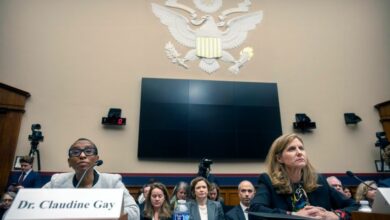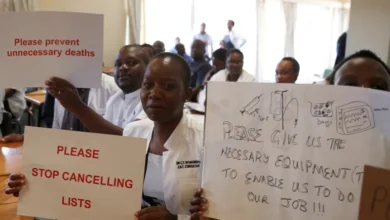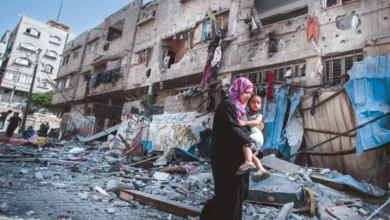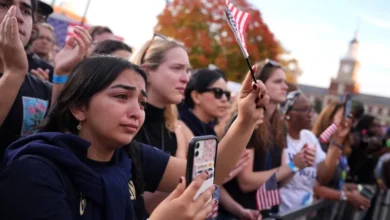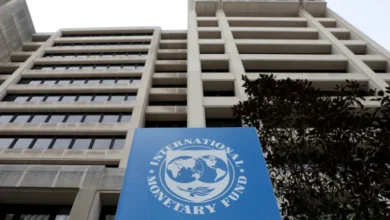It’s high time for all those at Harvard to stand with Palestine
Rameen A Javadian
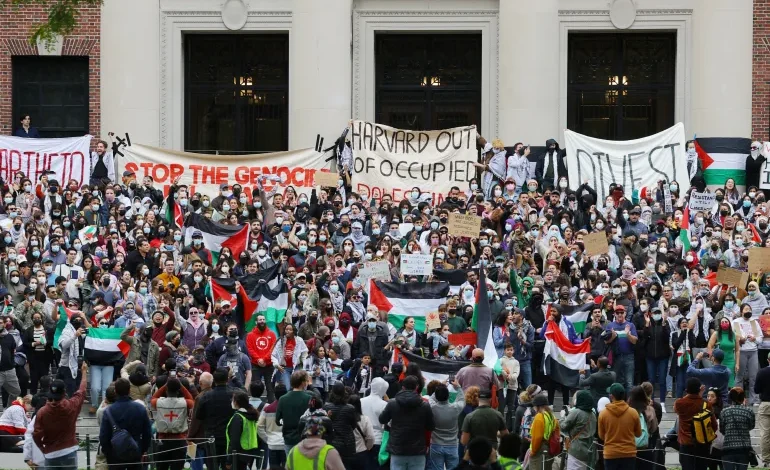
Rameen A Javadian
These days one of the most talked-about news stories in the United States is the resignation of Harvard University President Claudine Gay.
As Harvard and its leadership are centred in the media, however, Palestinians continue to be killed by US-supplied bombs and buried under the rubble of their homes, schools, mosques and hospitals.
While Harvard Yard is filled with speculation about the career of a millionaire academic, two million Palestinians are displaced by carpet bombing intended to ethnically cleanse Gaza.
Amid the attempted distractions from an actualised genocide whose targets include families of students at Harvard, those of us in solidarity with Palestine remain subject to relentless attacks.
Indeed, while hundreds of intellectuals at the university mobilised to sign a letter to the Harvard Corporation in support of Gay – the very president who spent weeks denouncing students protesting in solidarity with the victims of the ongoing Nakba – we are barely afforded minimal support.
The letter, urging the Harvard Corporation “in the strongest possible terms to defend the independence of the university and to resist political pressures”, received ample attention from the national media.
In the end, however, this effort by Harvard faculty not only failed to save Gay’s job but also did not translate into any meaningful support for those of us in solidarity with Palestine who refuse to cower. As Palestinians in Gaza and the rest of the occupied territories are subject to unfathomable conditions, relentless killing and irreversible destruction, at Harvard condemnation remains wrongfully assigned to students organising for justice in Palestine. Leading faculty appears ready to back only Gay, who, despite failing to recite the exact script demanded by Zionists, still classifies our activities in support of liberation as “abhorrent”.
When solidarity is reserved for elite academics during an active genocide and there is only limited activity to demand Harvard end its complicity, or even just protect students standing with the oppressed, we have a problem. When a Trump endorsee’s rhetorical trap is left unchallenged and there is no rejection of the harmful premise that students calling for the end of an actual genocide are somehow calling for a hypothetical genocide, we have a problem. When some mobilise to preserve “free inquiry”, but avoid recognising the Palestine exception to free speech, we have a problem.
For years, many have asked Harvard to disclose and divest from its material complicity in what has been widely recognised as an apartheid regime. In the past few months of censorship and particularly egregious threats to largely Muslim, Arab, Black, and brown students, we have been subject to attacks on campus.
A student-compiled list of over 70 incidents include: a woman in hijab chased by someone wielding a knife; doxing via a billboard truck while targeted students face job losses, evictions, and academic sanctions; frivolous police reports against visibly Muslim students; and students being followed and harassed for wearing a keffiyeh (by the wife of a Harvard professor who signed the letter in support of Gay). During her limited tenure which held capacity for making various Zionist claims in public and private spheres, President Gay did not recognise a single one of these incidents; not even behind closed doors when rare opportunities for Muslims to express their hurt presented themselves.Over the fall semester, victims of anti-Palestinian and anti-Muslim racism found little support from the majority of faculty signatories on the letter to the Harvard Corporation. Only around 10 percent of the 764 signatories joined an open letter asking Gay to recognise the suffering of Palestinians and denounce the silencing of supporters of Palestinian liberation (which she has never done, not even in her post-resignation op-ed). Even the killing of over 100 family members of a single Palestinian student at Harvard Law School has not been enough to garner sympathy – let alone rage – from this institution.
Recognising pervasive anti-Black racism, speaking out against the bigotry motivating Gay’s ousting – even if her administration perpetuated its own modes of injustice against marginalised communities – is necessary. Also necessary is recognising that following an earlier smear campaign by a billionaire mogul against a Black student protester and a Muslim security marshal, Gay would succumb to this hateful campaign and release an email to notify the public that these students are under investigation by local police and the FBI.
While Gay is backed by hundreds of faculty in an attempt to save her elite position, Elom Tettey-Tamaklo was promptly robbed of his job as a residential assistant, with minimal outcry. The president of Harvard at the time even condemned the liberatory phrase “from the river to the sea” Palestine will be free, in communication to the entire Harvard community. While leading intellectuals attempted to rescue Gay under the claim of free speech, many caused disappointment by ignoring Harvard’s neglect of its students speaking for a free Palestine.
Now, will these Harvard faculty sign on to support the crucial chapter of Faculty and Staff for Justice in Palestine?
Focus ought to shift towards understanding why many stand by, as students showing solidarity with Palestine face smear campaigns ignored or supported by their universities, and others within these institutions mobilise only for a president who boasts about punishing these students. Some at Harvard shamefully rationalise away speaking against the Zionist genocidal campaign, refusing to use institutional privilege to pursue veritas in the most basic way. Even as the university attempts to restrict speech and censure voices for Palestine, hundreds of faculty, who happily signed an open letter in support of Gay, turn away from their students advocating for justice in Palestine.
As Palestinians are slaughtered, many at Harvard, through rhetoric and actions, support their plight “from the river to the sea”. Yet elite academics and headlines only notify us of a defence for a president who credulously opened herself up to a frivolous congressional hearing.
As a grave injustice unfolds before our eyes, at the most basic level, Harvard – as one of the most influential institutions based in a nation that is the strongest ally to the Zionist project – must recognise Palestinian suffering.
It is high time for institutions like ours to end their material and moral complicity in this oppression. Let this be the time when people of influence in these spaces finally heed the calls to stand in solidarity with our movement for an end to the ongoing Nakba, before anything else.

